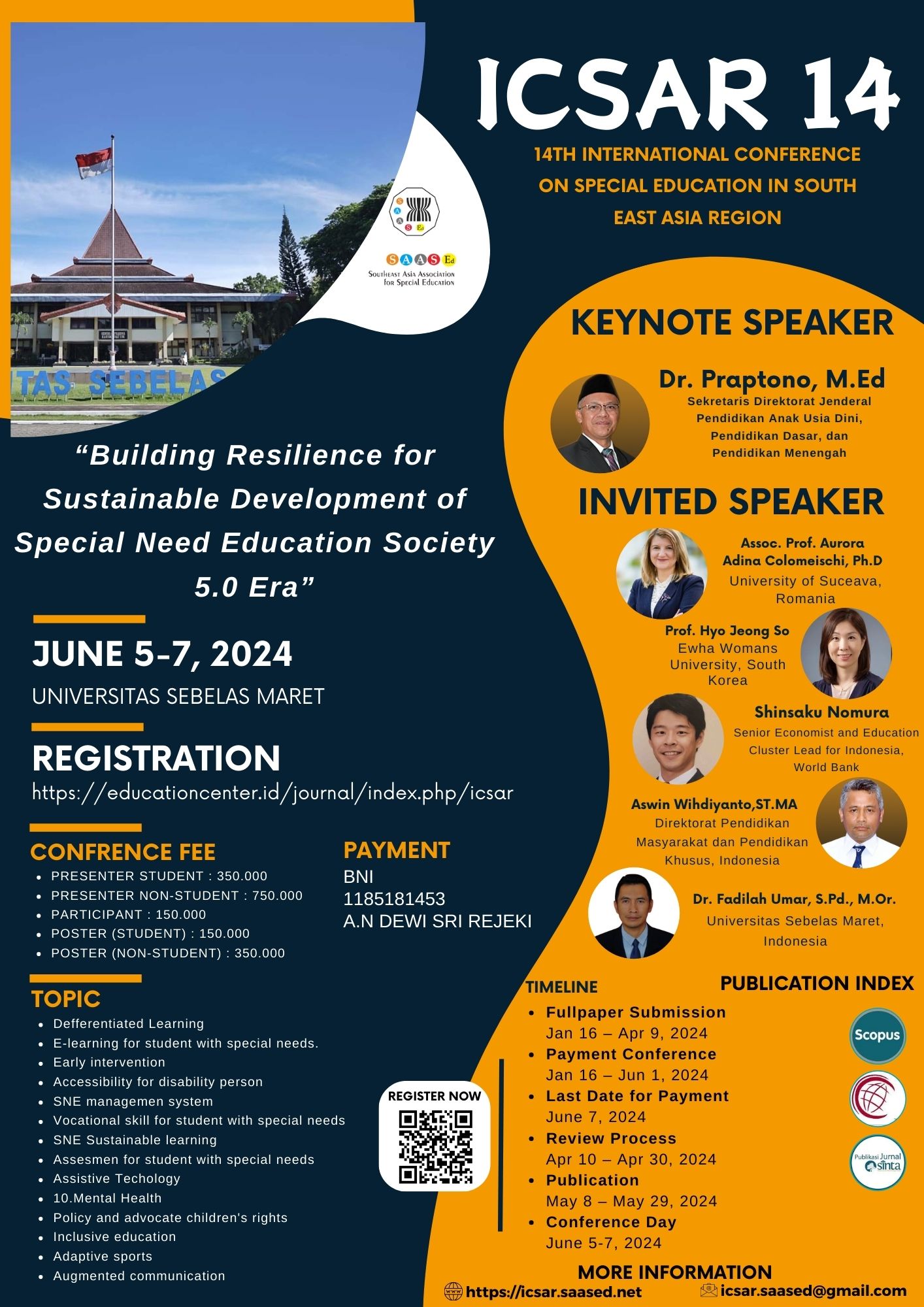People with disabilities are ready to compete in the Business and Work World Industry (IDUKA) through Vocational Education
DOI:
https://doi.org/10.57142/picsar.v1i1.27Keywords:
vocational education, hard skills, soft skills, deafness.Abstract
This study aims to describe the process of developing vocational education for children with hearing barriers. The approach is carried out using a descriptive qualitative approach through research design that is carried out in 3 stages, namely the description stage, the reduction stage and the selection stage. The results of the study describe in full the process of vocational education for children with hearing barriers carried out at SLB bandung city. Data analysis is performed using data triangulation through various instruments. Vocational education at SLB became a provision to face the Business Industry and the World of Work (IDUKA), so SLB developed various programs to equip vocational skills in the form of soft skills and hard skills. Vocational education is an independence program that is being developed in the world of special education. Efforts carried out in vocational education can develop the ability of students to become capable human beings in the world of work through strengthening hard skills and soft skills in certain fields. Upaya link and match conducted in vocational education has an impact on preparing students to face the post-school world by aligning the school curriculum based on the competence and needs of the business industry and the world of work.
References
Asfar, A.M. I. T., & Asfar, A.M. I. A. (2020). Foundation of Education: The Nature and Purpose of Education (Implications Of Philosophical Views Of People In Education). Method, 1(January), 1–16. https://doi.org/10.13140/RG.2.2.22158.10566
Baiti, A. A., & Munadi, S. (2014). The influence of practical experience, basic vocational learning achievement and parental support for the work readiness of vocational students. Journal of Vocational Education, 4(2), 164–180. https://doi.org/10.21831/jpv.v4i2.2543
Bauer, W., & Przygodda, K. (2003). Newe Learnng Concepts within the German System of Vocational Education. European Educational Research Journal, 22-40.
Dali Gulo. (1984). Psychology dictionary. Bandung : Tonis
Driyarkara, Nicolaus. (2006). Education a la Warung Sudut: Notes on Social, Political, and Cultural Issues. Editor G. Budi Subanar, SJ. Foreword F. Danuwinata, SJ. Yogyakarta, YK: Sanata Dharma Press University.
Elfindri, et al. (2011). Soft Skills for Educators. Jakarta: Baduose Media.
Guile, D., & Unwin, L. (2019). Introduction to the Handbook: Vocational Education and Training (VET) Theory, Practice, and Policy for a Complex Field of Inquiry. The Wiley Handbook of Vocational Education and Training, First Edition. , 1–16.
Kotsikis, V. (2007). Educational Administration and Policy. Athens: Ellin.
Langeveld (terj.). (1971). Theoretical / Systematic Paedagogiek. Jakarta: FIP-IKIP.
Lestari, M. (2019). The relationship of parenting with the independence of the child. Journal of Children's Education, 8(1), 84–90. https://doi.org/10.21831/jpa.v8i1.26777
Nugraha, A. (2017). Theoretical Study of Softskills-Metaskills Acceleration in Vocational Curriculum in Facing Industrial Revolution 4.0. 2013, 1–16.
Rohani, S., & Shaifullah, H. (2012). Optimization of Education Develops Independence of Children with Special Needs (Abk). Nadwa Journal, 6(1), 179–194.
Schuler, Randall S. and Susan E. Jackson.1999 Human Resources Management, 6th Edition Volume 2. Jakarta: Erlangga Publisher
Slameto. (2010). Learning and the Factors That Affect It. Jakarta: Indonesian Library
Syairaji, M., Rokhman, N., & Nuryati, N. (2017). Implementation of Vocational Education Paradigm in The Medical Record and Health Information Study Program of Gadjah Mada University. Vocational Health Journal, 2(1), 129. https://doi.org/10.22146/jkesvo.30325
Warhurst, Christopher, Tilly, Chris and Gatta, Mary (2017) A new social construction of skill. In: Warhurst, Christopher and Mayhew, K. and Finegold, D. and Buchanan, J. , (eds.) Oxford Handbook of Skills and Training. Oxford handbooks. . Oxford: Oxford University Press. ISBN 9780199655366
Wheelahan, L. (2019). Knowledge , Competence , and Vocational Education Introduction Bernstein' s Theory of Knowledge. The Wiley Handbook of Vocational Education and Training, First Edition, 97–112.
Downloads
Published
Versions
- 2024-05-25 (2)
- 2022-09-21 (1)
How to Cite
Issue
Section
Categories
License
Copyright (c) 2022 Angstrom Centre of Education Conference Series

This work is licensed under a Creative Commons Attribution 4.0 International License.





